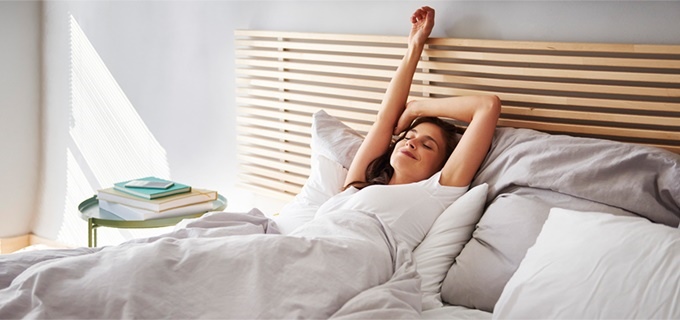Search for a doctor or hospital in your network.


Search for a doctor or hospital in your network.

Get News & Updates Directly To Your Inbox
 If you’ve already tried every sleep remedy out there, here is another option — more activity each day. Getting more movement is not just great for your body and mind, it can also help you get a good night's sleep.
If you’ve already tried every sleep remedy out there, here is another option — more activity each day. Getting more movement is not just great for your body and mind, it can also help you get a good night's sleep.It may seem odd to say that more activity can help you relax and rest better. But it may. Studies show that people who get at least 30 minutes of moderate aerobic exercise a day may see better sleep quality as soon as that same night.
Daily activity can help you get to sleep faster and stay asleep longer. More importantly, it helps you get better, deeper sleep.
Does just any activity help you sleep better? Yes. What matters is picking something you like and sticking with it, experts say.
What matters even more is when you exercise. If you’re active too close to bedtime, it can backfire. That’s because:
Everyone is different. So when it comes to timing your exercise, you should listen to your body and see what works best for you, says the medical director of Johns Hopkins Center for Sleep. ![]()
Sleep and exercise impact each other in many ways, says the Sleep Foundation. ![]() Not getting enough sleep, or only getting poor quality sleep, can lead to lower levels of physical activity. And lower levels of activity can lead to worse sleep.
Not getting enough sleep, or only getting poor quality sleep, can lead to lower levels of physical activity. And lower levels of activity can lead to worse sleep.
If you do exercise, in addition to it helping you sleep better, you may find it:
Better sleep can mean more energy, and it’s easier to exercise when you have energy, says the Cleveland Clinic. Boosting your activity level also helps:
If you’re not already active, start by adding in a little activity each day. You can build up to more activity over time and figure out what works for you. If you haven’t been active in a while, be sure to talk to your doctor before starting a new activity or increasing your activity.
If you’re already active and still having sleep problems, look at the timing and intensity of your activity. You can keep an exercise and sleep diary to track what you’re doing and figure out what works for you. When you figure out what works, it will soon become routine.
Make sure you also:
If you’ve tried it all and good sleep is still hard to find, talk with your doctor. Don’t just keep putting up with it. Refreshing sleep is vital for your mind and body.
Blue Cross and Blue Shield of Oklahoma, a Division of Health Care Service Corporation,
a Mutual Legal Reserve Company, an Independent Licensee of the Blue Cross and Blue Shield Association
© Copyright 2026 Health Care Service Corporation. All Rights Reserved.
Verint is an operating division of Verint Americas, Inc., an independent company that provides and hosts an online community platform for blogging and access to social media for Blue Cross and Blue Shield of Oklahoma.
![]() File is in portable document format (PDF). To view this file, you may need to install a PDF reader program. Most PDF readers are a free download. One option is Adobe® Reader® which has a built-in screen reader. Other Adobe accessibility tools and information can be downloaded at https://www.adobe.com/trust/accessibility.html.
File is in portable document format (PDF). To view this file, you may need to install a PDF reader program. Most PDF readers are a free download. One option is Adobe® Reader® which has a built-in screen reader. Other Adobe accessibility tools and information can be downloaded at https://www.adobe.com/trust/accessibility.html. ![]()
![]() You are leaving this website/app ("site"). This new site may be offered by a vendor or an independent third party. The site may also contain non-Medicare related information. Some sites may require you to agree to their terms of use and privacy policy.
You are leaving this website/app ("site"). This new site may be offered by a vendor or an independent third party. The site may also contain non-Medicare related information. Some sites may require you to agree to their terms of use and privacy policy.
Powered by Verint